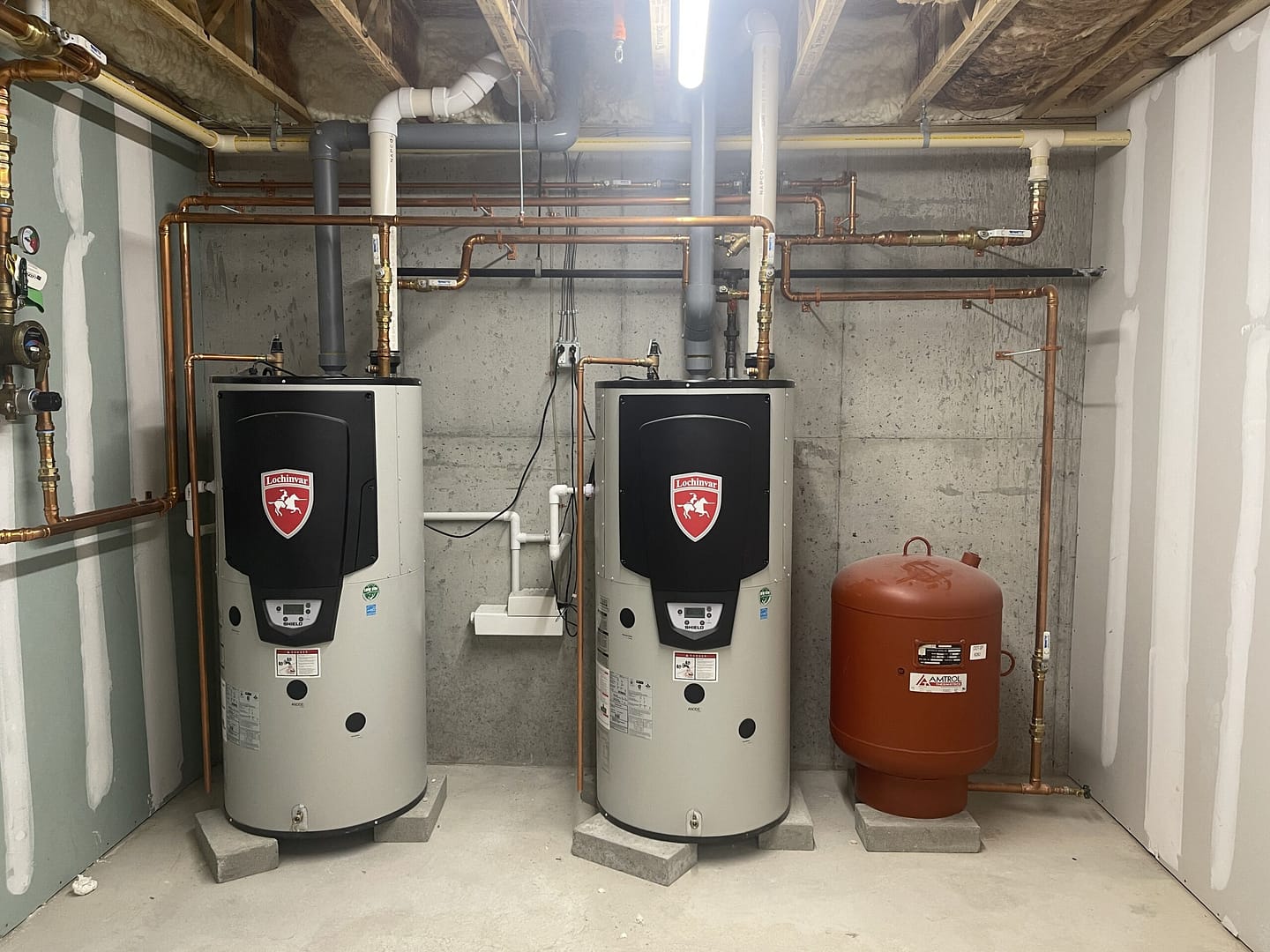Hot water is one of those things which, while we take it for granted, is an incredible luxury. The idea that water that’s ready for washing or doing the dishes is available at the turn of a tap is a remarkably new one in the history of our homes, but what’s actually going on when you turn the faucet? This is how a hot water heater works.
Types Of Hot Water Heaters
Gone are the days of having to warm cauldrons over the fire (though that’s not actually far off what some modern systems do). While all the different systems share a purpose- heating your water- different models use different mechanics to do this.
They can be broken down into the following two big groups:
- Tanked
- Tankless
Unsurprisingly, tanked systems heat and then store hot water in a tank, while tankless ones heat it on demand. There are various different types which fit into these categories, each working slightly differently and having its own set of pros and cons.
As a general rule, tanked systems are cheaper to install and maintain, but cost more to run. Tankless systems have steeper buy-ins but are considerably more efficient.
The most common types are:
Conventional Storage Tank Heaters
These are the most common type of hot water heater in the US. They consist of a tank and one or two electric heating elements or a gas burner. They’re easy to install and maintain but have longer recharge times than other models once the hot water is finished.
Tankless Water Heaters
These come in various shapes and sizes and could be combined with your home’s central heating (known as a combi-boiler). There are both gas and electric models on the market. They heat water as it flows through the unit, providing heating on demand. This makes them very efficient as you’re not heating a whole tank to wash a single dish.
Heat Pump Water Heaters
Heat pumps are quickly gaining prominence on the market. They use the same principle as a fridge (but in reverse). Rather than taking the heat from within a box and drawing it out, it pulls it in. This could be from the air outside or even from the ground. They’re hugely efficient (up to 300%!) but costly to install and not always ideal for older homes.
Solar Water Heaters
Working on the same principle as the solar panels which generate electricity, solar water heaters are usually located on your roof. Here, water is passed through very thin tubes and exposed to the warming rays of the sun. It’s then stored until you’re ready to use it. They’re very cheap to run but expensive to install.
Condensing Water Heaters
Another on-demand version of a tankless water heater but with an important distinction. Rather than simply burning gas, a condensing water heater harnesses the exhaust fumes created to boost the efficiency of the heat exchanger. If you’ve got gas fired heating, these can be a great option in terms of efficiency.
While that covers the basics, what are the actual mechanics at play? How do hot water heaters work?
How A Conventional Storage Tank Heater Works
The Heating Process
Coming in both electric and gas powered versions, the process of heating varies slightly between models. Regardless of the fuel type, cold water is pulled into the tank from the general supply and a thermostat regulates the temperature. They’ll both also have components like anode rods to attract impurities from the water and a dip tube to push cold water down towards the bottom. Likewise, they’ll also have an insulated tank to keep whatever you’ve heated nice and warm for as long as possible and safety features including pressure relief valves and temperature controls.
In an electric model, an element (or sometimes two, one located near the top and one near the bottom) heats up as electricity passes through them. Once the tank reaches the desired temperature, the thermostat kicks in and turns them off.
In a gas model, the tank sits atop a burner, much like a gas burner in the kitchen. This uses the heat produced by burning the gas to warm the water before it’s pushed out to your faucets and showers.
Energy Sources Comparison
As a general rule, a new gas powered hot water heater will cost more to install but cost less to run than electric models.
In terms of recovery rates (the time it takes to heat a tank from cold), gas takes the edge, but only slightly.
Electric heaters win on on-going maintenance costs and longevity, offering simple part replacements and an average of 3 more years of lifespan.
How A Tankless Water Heater Works
Offering on-demand water heating and not requiring a bulky storage tank, tankless systems are ideal for smaller homes. Water is heated instantly as it passes through the unit from the cold supply via means of a heat exchanger. In gas models, the exchanger is heated by a small flame which could be further enhanced through condensation of the exhaust fumes. In electric versions, the heat exchanger is heated like an element.
Pros and Cons
They’re generally more efficient than tanked systems as they only ever heat the amount of water required. This cuts down on waste and, with careful usage, could cut your utility bills.
On the downside, tankless systems can present problems with flowrate. Larger homes, or ones where multiple people will be using the hot water at once might find they struggle as they have limited capacity. They also require regular maintenance and descaling to prevent mineral build up within the system.
How A Heat Pump Water Heater Works
Heat pump technology is nothing new, but it’s only recently that we’ve started to see them being pushed as domestic water heaters. They’re incredibly efficient, yielding a lot more energy out as heat than they take in from the electric supply (up to 300% under laboratory conditions). They’re absolutely ideal if you’re considering an eco-friendly upgrade and can also heat your home.
To understand how these hot water heaters work, it’s best to think of them as a kind of reverse refrigerator. While your fridge pulls heat from within the unit out, these take heat from outside (either the air or the ground) and pull it in
Pros and Cons
In terms of efficiency and environmental impact, it’s hard to beat heat pumps. Their running costs are tiny and they produce considerably more heat energy than they draw in from your electrical supply. This gives them a huge edge in terms of reducing your carbon emissions over both tanked and tankless systems.
On the other hand, they’re expensive to buy and install and not suitable for all homes. They can struggle with cold environments (though it does have to be really quite cold- they can work up to -13of and only start to lose efficiency between 25 and 40o f). They’re also relatively slow to heat large quantities of water when compared to traditional types of water heater.
Factors Affecting Water Heater Efficiency and Performance
Whichever type of water heater you opt for, there are numerous things which will impact how well it performs and its running costs.
- Capacity: Generally, the bigger the more expensive. This applies to both tanked and tankless systems. The more water your heater heats at any one time, the more it will cost to run.
- Energy Source: Gas is generally cheaper than electricity and heats water more quickly. That being said, heat pumps use very little electricity and solar systems even less so are often the most economical in terms of long-term costs.
- Location of Installation: A system which stores water will lose heat from its tanks over time. This problem is exacerbated if that tank is located in an uninsulated space like an attic or outbuilding. Tankless systems aren’t totally immune to this effect either. A particularly long run of pipe can cause a noticeable drop in temperature.
- Regular Maintenance: Whichever system you opt for, keeping up with the maintenance requirements will keep things as efficient as possible. Tanked systems need regular flushing and the anode rods checking. Tankless systems need descaling and every system needs regular inspections.
Choosing the Right Hot Water Heater For You
All the potential systems come with their own set of pros and cons and which is right for you will come down to your own preferences and circumstances.
It’s worth putting some serious thought into your options here, taking into account:
- Budget: is upfront cost more important than long-term savings?
- Energy Efficiency goals: how much value do you place on environmental concerns and long-term savings?
- Home size and water demand: how much water you need and how far it has to go is always going to be a key issue.
Talking to a professional plumber can help you weigh up your options. They’ll not only be able to install and maintain your new hot water heater, they’ll be able to talk you through the quirks and foibles of each model. That means you’ll be making an informed decision.

